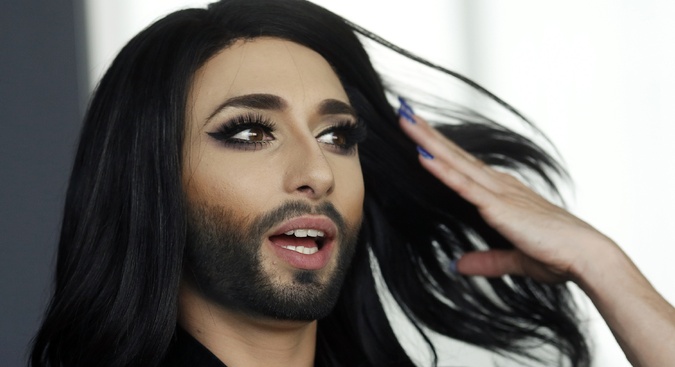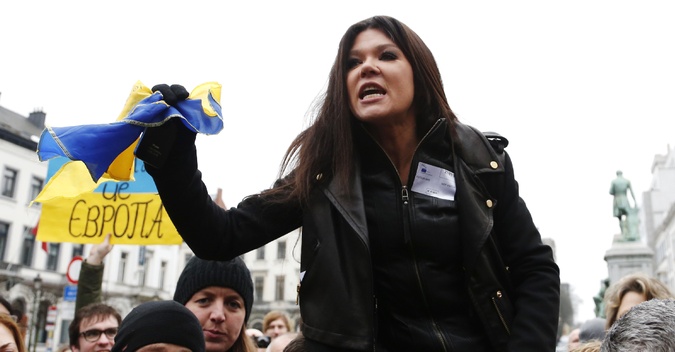
Europe’s Nuclear Option
May 7, 2014
Blame Europe’s 70 year holiday from history for the West’s terrible decline
May 7, 2014Beneath the annual extravaganza of sequins and lights, the Eurovision Song Contest is an undeniably political event, from the strategic voting to using the competition as a way to boost a country’s image on the continent. But this year, turmoil in Ukraine and Russia’s anti-gay propaganda laws both look set to further politicize an event already known for its combination of bombastic enthusiasm and subtle lessons in international relations.
Watched by an estimated 125 million viewers across the world, the nearly 60-year-old contest remains an obscure event to many Americans. The Eurovision song contest began in 1956 as a way to unite European countries after the continent-wide trauma of the Second World War, and has expanded to include more countries joining the ever-changing Europe landscape. Waves of turmoil and change have swept over Europe since then, but a few alliances have formed.
Voting Blocs
The most established voting blocs, formulated by Derek Gatherer, a lecturer at Lancaster University, include “The Viking Empire” of Scandinavian countries; “The Balkan Bloc,” which includes Romania, Serbia, and Albania; and “The Pyrenean Axis,” which includes Andorra and Spain.
Eurovision’s political voting initially appears to follows geography. Greece and Cyprus have historically voted for each other and not for Turkey, although points are increasingly shared between all three countries, says the aptly-named expert Dr. Eurovision (real name Paul Jordan). Members of the Balkan voting bloc, usually one of the largest and most influential, also favor each other, but it’s more for cultural reasons than political affinity. “Bosnia and Serbia don’t really get on, and Albania and Serbia don’t really get on, but they tend to vote for each other in Eurovision,” Jordan said.
The Balkans: This year, the Balkans bloc will be “significantly weaker” because of the ongoing financial crisis, said William Lee Adams, founder of Wiwi Bloggs, one of the largest independent blogs on Eurovision, and a correspondent for Newsweek and CNN. The struggling economic climate meant that Serbia and Croatia both had to pull out, “so we only have the Former Yugoslav Republic, Macedonia, Slovenia, and Montenegro,” Adams said. “When people talk about about ‘bloc voting,’ you need a bloc, so if half of your bloc is missing, you’re not going to do very well, are you?”
The Former Soviets: Another mammoth voting bloc is the former Soviet Union; because of the cultural cohesion, Russia is usually guaranteed to do well. “Everyone pays allegiance and homage to the mother Russia still. Russia could show up without a song and they could still make the final,” Adams said. “It’s not political, it’s cultural. These people have a shared cultural heritage, so naturally there’s going to be an affinity for the Russian song, which was probably made by Russian people.”
The UK/Ireland/Malta: A rival, unconventional voting bloc has emerged in recent years with the U.K., Ireland, and Malta all voting for each other. During the tumultuous 20-year period known as The Troubles, it was rare for the U.K. and Ireland to give each other points. “Now, every year, the U.K. depends on those seven or eight points from Ireland, to save us from the dreaded nil points,” Jordan said. The U.K. is often the country most in need of as many points they can get. When the U.K. entered perma-tan crooner Engelbert Humperdinck in 2012, “it [was] like they took a corpse and reanimated it,” Adams said.
Speculation over so-called political voting is no secret to Eurovision officials, who say it’s “very easy to get caught up” in the guessing game. Sietse Bakker, a Eurovision Song contest event supervisor, told The Wire that taste, “a certain cultural sound you’re familiar with,” or more attention paid to a song are reasons to voting, not just politics. And a good song will cut through all of that.

already generated a great deal of controversy. Reuters / Leonhard
Foeger
There’s very fine line between “culture” and “politics” in Eurovision, which explains why the myth of political voting has persisted for so long. “In reality, there are [many] more points being exchanged that are not political,” Bakker said. Using Greece and Cyprus as examples, he said, “The two countries have long historical and cultural ties, effectively share a media landscape, people speak the same language and many people have relatives in the other country, or go there for holiday. This naturally results to an exchange of points.”
Eurovision as a Political Tool
While Eurovision is still just a TV show (albeit a spectacular one that plays to millions worldwide), and not a political event, countries shrewdly use it to their advantage. “Politics does come into it, and countries do use it for political purposes. Even Turkey, when they staged it, they used as a way as promoting Turkey’s European credentials,” Jordan said. “They’ve been trying to get into the EU for a long time, and they’re still knocking on the door. Eurovision was seen as some sort of foothold, particularly in the popular psyche.”
Contest theme: Host countries have also been known to surreptitiously send a message to the rest of Europe about their political position through the contest’s motto or theme. This year the motto is #JoinUs, a simple, interactive rallying cry designed for social media. When Turkey hosted in 2004, the theme was ‘Under the Same Sky,’ a slight dig at Europe’s gatekeepers as they were ramping up efforts to join the EU and be under that same sky. “That logo is explicitly political,” Adams said. For Germany’s hosting duties, the motto was ‘Feel Your Heartbeat,’ a reminder that Germany is the heart of Europe, and the most powerful nation.
Rite of passage: Eurovision is a rite of passage for many countries, especially for newly independent nations, or those hoping to become part of the European Union’s beneficial embrace. The contest, much like Miss World, the World Cup, and the Olympics, is a stage for countries to come out to the world after years of oppression, and showcase the first flushes of independence. Estonia became independent in 1991 and is a perfect example of the importance of Eurovision for a nation’s image abroad. “It was very much seen by the government as a way to control Estonia’s image internationally, so they viewed it very seriously,” Jordan said. The country’s victory in 2001, before a 38,000-strong crowd in Copenhagen, came at a decisive time; in 2004 they joined the EU.
Damage control: While some Western European nations—Germany, France, the United Kingdom—don’t have to worry much about what the world thinks of them, Eurovision gives smaller countries (raise your hand if you can place San Marino on a map) a chance to take the spotlight. For other nations like Azerbaijan and Turkey, saddled with bad reputations from human rights abuses or corrupt governments, Eurovision gives them the opportunity to recast their image. As Jordan points out, for a few weeks, at least a light is shed on their shortcomings.

2004 Eurovision Song Contest, speaks to pro-EU Ukrainian
protesters who outside the EU Parliament in Brussels in
January. Reuters / Francois Lenoir
Political Controversies This Year
Russia and Ukraine: This year, ongoing turmoil between Russia and Ukraine might throw the established voting landscape off balance. Media exposure of Ukraine, and the narrative portraying them as victims in the conflict, will give them a points boost this year, Adams said. It’s “difficult to say” how the countries will vote for each other, Jordan said, but the countries’ respective acts will likely end up meeting backstage.
“There’s a lot of sympathy in Western European media for the Ukraine, and that trickles down to the Eurovision voters,” Adams said. “I don’t think that Russia will be hurt by the ongoing political tension with Ukraine, but I think Ukraine could stand to gain from them.” The official video for Ukraine’s Eurovision entry this year shows singer Maria Yaremchuk dancing in a hamster wheel, which Adams said makes viewers think, “‘Oh my God, I feel so bad for her people, let’s vote,’” adding, “You could say it’s a reflection of the crisis, it just keeps spinning out of control.”
Russia’s anti-gay propaganda laws: Russia’s anti-gay laws present another unique problem to Eurovision this year. Eurovision is often referred to as the Gay Olympics, and when Jordan recently attended a Eurovision event in London, the crowd booed when they heard the Russia’s entry, a breathy song by blonde teenagers, the Tolmachevy Sisters. “A lot of fans who go to Eurovision are gay, and the vast majority of people in the audience are gay men, so it’s going to be interesting to see the reaction that [Russia’s entry] will get,” Jordan said. “The crowd are going to make their feelings known.” How Russia will cover the event in their media, particularly Austria’s entry, the popular bearded drag queen Conchita Wurst, remains to be seen.
Denmark is this year’s host country, and coverage will likely be similar to that of Sweden last year: fully inclusive of the contest’s gay audience, including the broadcast of a gay kiss and an address to the “12,000 dancing queens in the crowd” who hadn’t met the right girl yet. Azerbaijan’s hosting duties in 2012 were a “complete contrast,” Jordan said; constant camera panning to women dancing with flags misrepresented an audience that was predominantly gay and male, not female.
Next year’s host country? Still a mystery.
Because no one knows where next year’s Eurovision will be until the winning vote is announced, attendees often end up in countries less politically open-minded than their home nations. In Azerbaijan, Jordan said, being gay passed over most peoples’ heads. “Things are read in different ways. There were men walking around hand in hand, but there wasn’t any connotations attached to that. There wasn’t the same acknowledgement or understanding,” Jordan said. “They didn’t quite get why there were all these men at Eurovision without their girlfriends.”
Despite the spectacle of elaborate costumes, unnecessary back-up dancers, and the lingering air of utter madness, Eurovision is an inherently political event, and a reminder of Europe’s enormous diversity. “Some people do live in difficult parts of the world. We’re only a few hours away by plane,” Johnson said. “Europe is not one, socially, economically, or politically.”




